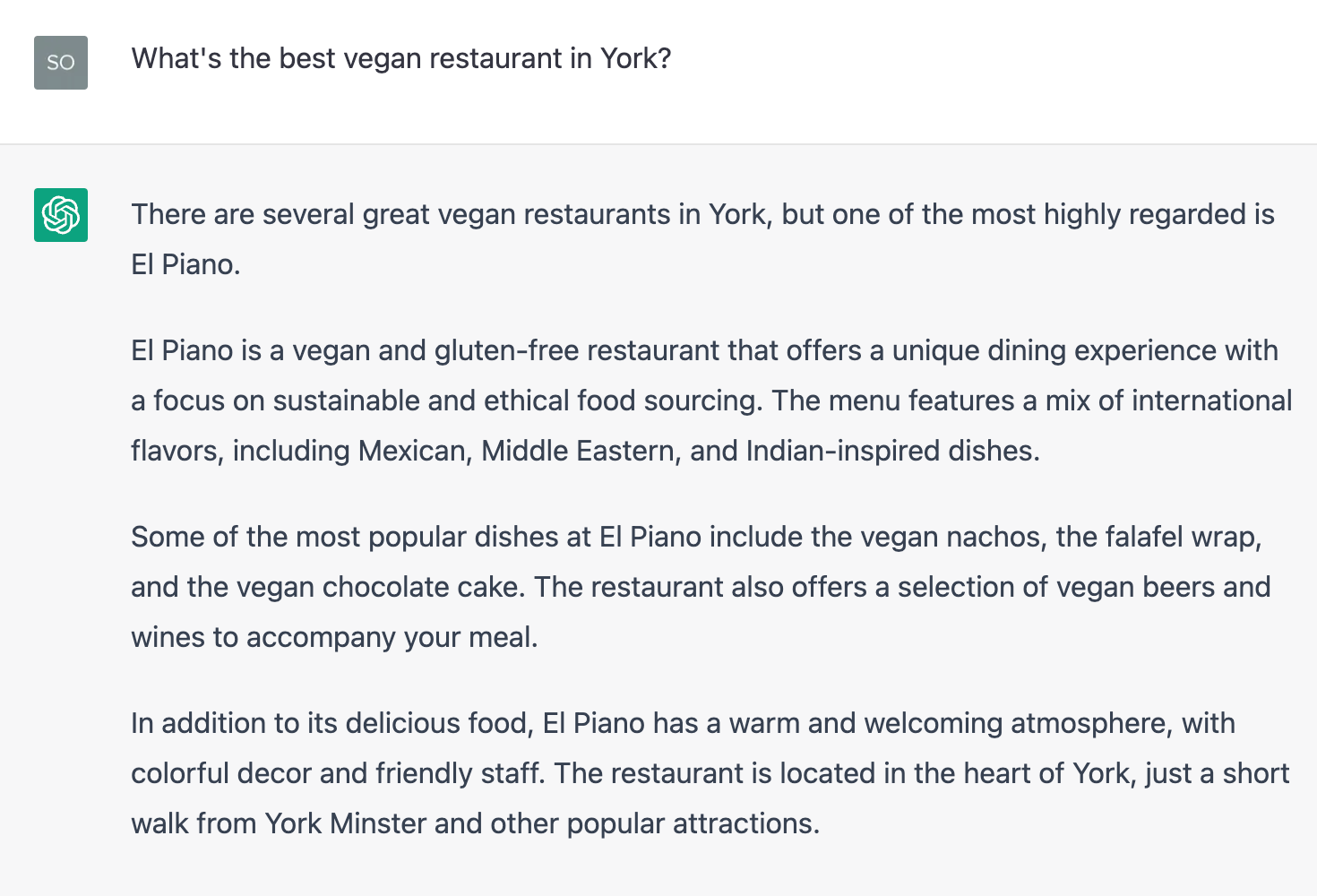Can ChatGTP write a better travel article than a travel writer?
A ‘glorified word processer’ or something more sinister that’s after your job? Joanna Whitehead explores the cult of ChatGPT to find out whether travel journalists need to start worrying


Fast, intelligent, cheap: ChatGPT – the AI chatbot system capable of spewing out facts like a caffeinated Stephen Fry – is the hot new thing on the block that’s here to claim everything you hold dear. Or so it seems to a slew of journalists who have begun questioning their credentials now big tech is here to do what they do best – except faster and for less money.
In recent months, we’ve seen the loquacious creation firing out answers to life’s big questions, writing haikus, job applications and even producing a university paper in 20 minutes and bagging a 2:2 grade in the process. With its seemingly infinite ability to regurgitate facts about everything from Jan Morris to Mauritian cuisine, some journalists have begun to worry that their jobs might be at risk.
Lisa Gibbs, the director of news partnerships at the Associated Press, noted in a December Google News Initiative talk that while “robots are not the journalists of the future – they are a journalist’s assistant, a very good one”, she added that her organisation could “find news faster and break news faster” with the aid of AI. Elsewhere, Reuters has used an in-house AI programme called Lynx Insight since 2018 and The Washington Post has produced machine-written snippets of copy using its in-house robot report, Heliograf.
In recent days, Reach – the UK’s largest commercial, national and regional news producer responsible for the Daily Mirror and the Daily Express – has created a working group to explore whether ChatGPT could help journalists write short news stories.
After more than two turbulent pandemic years, it’s entirely understandable that travel journalists are feeling somewhat twitchy about their profession. But surely this omniscient tool couldn’t ever compete with a real-life travel writer? In a bid to size up the competition, I decided to break the ice and start a conversation.
I spent the first 20 years of my life in York and regularly return to this mini-break hotspot. As an area I know plenty about, I decided to pit myself against ChatGPT – because my confidence was apparently overdue for a battering.
I began slowly. “How would you spend a weekend in York?” Its reply? “As a language model, I cannot spend time or have preferences.” Doh! Part of me feels patronised, but another small part of me feels weirdly sorry for this collection of codes. “However, I can provide you with some suggestions on how to spend a weekend in York.” ChatGPT went on to list visiting York Minster (essential), walking the city’s mediaeval walls and having a drink in a traditional pub – “the Ye Olde Starre Inn claims to be the oldest”. So far, so accurate.
“What are the best restaurants in York?” was my next question. In recent years, the city has seen an influx of award-winning fine dining establishments, such as Roots and Skosh, establishments which ChatGPT duly reeled off. These are not cheap restaurants, however, so what ChatGPT recognises as “the best” is debatable.
By question three, I’d called its bluff, however. “What’s the best vegan restaurant in York?” It replied: “There are several great vegan restaurants in York, but one of the most highly regarded is El Piano.” Rumbled! El Piano, the glorious vegan restaurant owned and launched by Magdalena Chavez in 1997, closed its doors for the last time in 2018. Vindication!

Spoiler: ChatGPT is incredibly addictive, so I asked a final question closer to my current London home. “What’s the best thing to do in Dalston?” ChatGPT made three suggestions, one of which included “enjoying the nightlife”. But what’s this? “Some popular spots include Dalston Superstore, Visions Video Bar, and The Nest”. Bing! The Nest sadly closed in 2018, as did Visions Video Bar. A villainous laugh begins to rise up my body. Take that robot overlords – travel journalism is safe!
Before sharing the good news, I decided to consult some experts working in AI for their opinion. Reassuringly, they were all united in their belief that ChatGPT would not replace human writers any time soon.
Professor Mike Wooldridge, professor of computer science at the University of Oxford and director of foundational AI research at The Alan Turing Institute, said: “This technology [ChatGPT] will replace journalists in the same way that spreadsheets replaced mathematicians; in other words, I don’t think it will. It’s a glorified word processor.
“If you put it another way, ChatGPT is this weird disembodied thing that’s never experienced anything in the world. It’s got tremendous competencies in many ways to do with generating and understanding language, but it’s never experienced anything. The idea that it could generate a news story surrounding an emotive subject is extremely implausible.”
He added that the text ChatGPT produces “tends to be very bland – it lacks character. There is no human element. There is no empathy, no understanding there – and that’s what journalists bring. For most of us, it’s just going to be another tool that we use. And the immediate real value is going to be in routine handling tasks to do with processing text, summarising and extracting key points. That’s not what we need journalists for. We need journalists to bring human insights.”
Dr Mhairi Aitken, ethics research fellow at The Alan Turing Institute, agreed, stating that “the importance of human voice for good journalism is so crucial”. She also highlighted the problem with ChatGPT that I’d experienced: it’s tendency to regurgitate inaccurate information. “If tools like ChatGPT are relied upon, the amount of effort that has to go into fact-checking is probably greater than if it was written by a human journalist,” she added.
What makes a good travel story? According to ChatGPT, it’s one “that engages the reader and transports them to a different time and place”, one with “a strong narrative arc”, “descriptive language”, and “a personal connection”. Like anything, there’s a degree of subjectivity to such a question. But we can all probably agree on what doesn’t make a good travel story - and I suspect ChatGPT’s attempts would fit this bill.
When I read a travel story, I almost always enjoy the bad bits – terrible weather, obnoxious fellow passengers and dodgy stomachs – as much as the good. I’m not necessarily interested in a highly-sanitised account of a destination and the best stories I read are the kind of yarns I’d hope to hear from a friend over a pint.
Stories such as Alastair Gill’s atmospheric experience of walking the West Highland Way in the depths of winter, Tamara Hinson getting up-close-and-personal with insects in Belize, and Alex Robinson’s tour through the Rio Negro sing with life, colour and excitement. They transport us from the grey humdrum of an open-plan office in middle England to places wild and wonderful. They inspire us.
And, while there’s no disputing the capability of tools such as ChatGPT to educate and inform, it’s also a reminder that for meaningful, unique perspectives on the world around us, human beings have the upper hand. For now.
Join our commenting forum
Join thought-provoking conversations, follow other Independent readers and see their replies
Comments


Bookmark popover
Removed from bookmarks